

Search the Invisible Web With a Directory. Ukryty Internet. Is Quandl the easiest way to find and use numerical data on the internet? (This article was originally published at Access to Statistics, and syndicated at StatsBlogs.)
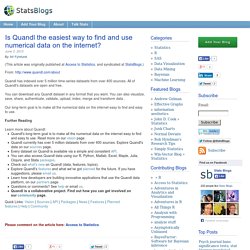
From: Quandl has indexed over 5 million time-series datasets from over 400 sources. All of Quandl's datasets are open and free. You can download any Quandl dataset in any format that you want. You can also visualize, save, share, authenticate, validate, upload, index, merge and transform data . It’s a beautiful thing when free data meets free analytics.
All the free data-analysis tools in the world aren’t too useful if there aren’t also some free datasets available to analyze.
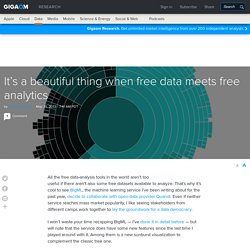
That’s why it’s cool to see BigML, the machine learning service I’ve been writing about for the past year, decide to collaborate with open-data provider Quandl. Even if neither service reaches mass market popularity, I like seeing stakeholders from different camps work together to lay the groundwork for a data democracy. I won’t waste your time recapping BigML — I’ve done it in detail before — but will note that the service does have some new features since the last time I played around with it. Among them is a new sunburst visualization to complement the classic tree one. However, if you’re new to Quandl (like I am), it’s pretty cool. Even better than that is the service’s “Supersets” feature, which lets you add columns from multiple datasets — in one click, mind you — together to form one big dataset comprised of a bunch of disparate variables.
Deep Web Research and Discovery Resources 2015. Editor's Note - some of the sources in this guide require registration, download and in some cases, fees.
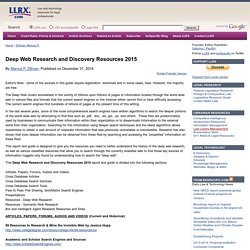
However, the majority are free. The Deep Web covers somewhere in the vicinity of trillions upon trillions of pages of information located through the world wide web in various files and formats that the current search engines on the Internet either cannot find or have difficulty accessing. The current search engines find hundreds of billions of pages at the present time of this writing. 10 Search Engines to Explore the Invisible Web.
Not everything on the web will show up in a list of search results on Google or Bing; there are lots of places that their web crawlers cannot access.
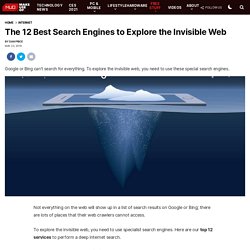
Deep Web Search - A How-To Site. Where to start a deep web search is easy.
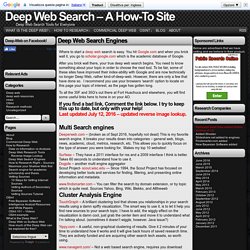
You hit Google.com and when you brick wall it, you go to scholar.google.com which is the academic database of Google. The Ultimate Guide to the Invisible Web. Search engines are, in a sense, the heartbeat of the internet; “Googling” has become a part of everyday speech and is even recognized by Merriam-Webster as a grammatically correct verb.
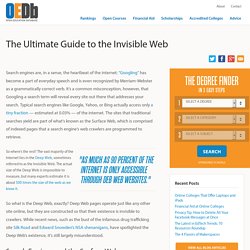
It’s a common misconception, however, that Googling a search term will reveal every site out there that addresses your search. Typical search engines like Google, Yahoo, or Bing actually access only a tiny fraction — estimated at 0.03% — of the internet. 99 Resources to Research & Mine the Invisible Web. College researchers often need more than Google and Wikipedia to get the job done.
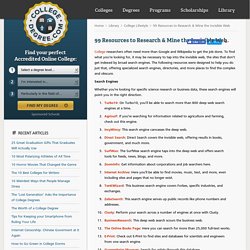
To find what you're looking for, it may be necessary to tap into the invisible web, the sites that don't get indexed by broad search engines. The following resources were designed to help you do just that, offering specialized search engines, directories, and more places to find the complex and obscure. Search Engines Whether you're looking for specific science research or business data, these search engines will point you in the right direction.
Scholar.pdf. An Investigation into the Deep Web - Maddie Morris. The Deep Web is even more extensive and arcane than its cavernous name intimates, and it doesn’t help that a sea of misinformation surrounds it.
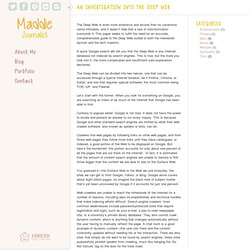
Untitled. From The Search Engine Report July 6, 1999 Lycos and IntelliSeek, maker of the BullsEye desktop search utility, have teamed up to produce an index of search databases to help users find information that is invisible to search engines.
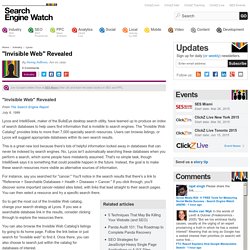
The "Invisible Web Catalog" provides links to more than 7,000 specialty search resources. Users can browse listings, or Lycos will suggest appropriate databases within its own search results. This is a great new tool because there's lots of helpful information locked away in databases that can never be indexed by search engines. No, Lycos isn't automatically searching these databases when you perform a search, which some people have mistakenly assumed. For instance, say you searched for "cancer. " Le jour où j'ai plongé dans le deep web. >> Le deep web, machine à buzz, le récit de notre deuxième plongée en mai 2014.

G. Beyond Google: the Deep Web - Tutorial 2012 - The Free Web - Resources by Subject at SUNY Potsdam. Click here - go to the new tab (and log in if necessary) - then come back. The United States, democracy and free country that it is, considers an educated citizenry to be essential. Thus the system of public libraries in our communities, the many debates about the quality and content of public education AND...information produced and distributed by government agencies about all sorts of things.
According to the Federal Library Depository Act of 1962, a government document is defined as “informational matter which is published as an individual document at government expense, or as required by law”. Le jour où j'ai plongé dans le deep web. Cloaked Internet: What Is the 'Invisible Web'? August, 2013 Many untrained users have the naive expectation that they can locate anything on the world wide web by using Google or Yahoo or Ask.com.
Beyond Google: The Invisible Web - Invisible Web-ography - LaGuardia Community College Library Media Resources Center.